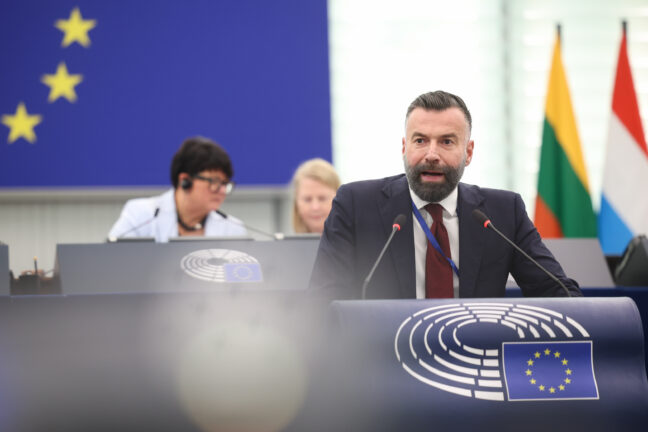Across the EU, the line between national security and fundamental freedoms is becoming perilously unclear. Digital surveillance technologies, originally developed to combat terrorism and organized crime, are increasingly becoming tools of repression against journalists, political opponents, and civil society actors. This must stop, says MEP Alessandro Zan (S&D/IT).
To address this escalating abuse, the European Parliament established the PEGA Committee, which conducted a comprehensive inquiry into the misuse of spyware across member states. Its final report offered clear recommendations for banning and sanctioning unlawful surveillance.
“We cannot allow EU governments to exploit national security exemptions—or act outside the law altogether—to deploy spyware like Pegasus or Paragon against their own citizens, violating fundamental freedoms and the rule of law,” warns MEP Alessandro Zan (S&D/IT), member of the European Parliament’s Committee on Civil Liberties, Justice and Home Affairs (LIBE).
LIBE has called for legally binding EU legislation to ban the illegitimate use of spyware, ensure independent oversight, procurement transparency, and establish effective remedies for victims of abuse.
You might be interested
Protecting citizens from digital profiling abroad
Digital rights transcend EU borders. Recent revelations about US President Donald Trump administration’s use of digital profiling to monitor students based on political beliefs have raised transatlantic concerns. “The European Union has a duty to protect its citizens’ data even outside the Union’s borders. The use of digital profiling in Trump’s United States for ideological or political purposes is intolerable,” says Mr Zan.
According to the MEP, the EU must press for greater transparency in transatlantic data agreements and condition international data flows in full compliance with the General Data Protection Regulation (GDPR).
The EU has a duty to protect its citizens’ data even outside the Union’s borders. – MEP Alessandro Zan, member of the European Parliament’s Committee on Civil Liberties, Justice and Home Affairs (LIBE)
“We need firm diplomatic action to ensure our citizens are not treated as potential threats simply for expressing critical views or participating in democratic movements,” Mr Zan adds.
Security versus freedom
The Italian parliamentarian also draws attention to internal trends in several member states: the expanding use of repressive laws under the guise of national security.
“Take what is happening in my country, Italy, under Giorgia Meloni’s government. They passed a law that effectively targets dissent by limiting the right to protest and introducing new criminal charges, such as ‘passive resistance’,” Mr Zan told EU Perspectives. “Security must not be used as a pretext to suppress civil rights, freedom of expression, and digital privacy.”

LIBE’s Rule of Law Report, adopted in plenary on 18 June, outlines a broader concern across the EU. In some member states, governments increasingly criminalise protests, normalise mass data collection, and use surveillance as a tool for political control.
Paragon scandal, a wake-up call
Among the most alarming recent developments is the Paragon spyware scandal, which Mr Zan describes as one of the most severe digital rights violations to date: “It is a deeply serious matter that undermines trust in democratic institutions at its core.”
The MEP claims that Italian journalists and activists often become targets, yet the government fails to acknowledge the breach, let alone investigate or offer protections to those affected.
Paragon spyware scandal is a deeply serious matter that undermines trust in democratic institutions at its core. – MEP Alessandro Zan
“Not a single word to protect the journalists who were spied on. No action to safeguard citizens’ data and privacy – as Italian and European law require. No answers about who authorized the use of such intrusive tools,” he says.
Italy, however, is not an isolated case. Hungary, Poland, Greece, and Spain have all seen similar spyware deployments, often as political weapons aimed at silencing opponents.
‘Binding EU-wide legal network is necessary’
While the European Media Freedom Act marks a step forward, introducing protections against spyware use, Mr Zan notes that national-level exemptions severely weaken the regulation’s scope. “That is why we need a stronger, binding European legal framework that unequivocally bans the illegal use of spyware against journalists, trade unionists, and political opponents. And we need it now,” he says.
As Europe grapples with growing geopolitical instability and rising authoritarianism in its midst, the balance between security and civil liberties is more fragile than ever. Mr Zan’s warning is clear: without urgent legislative action, Europe risks normalising surveillance as a political tool, threatening the very democratic values it purports to uphold.











